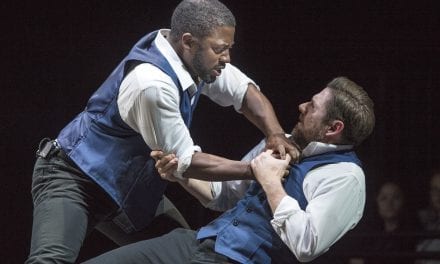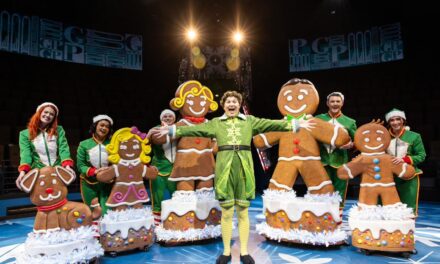OREM — My first experience at a Grassroots Shakespeare Company production was an overall delight. My daughter and I got to the outdoor venue early, and we thoroughly enjoyed 20 minutes of pre-show entertainment. The band and other performers were charming. I loved Gary Argyle and Steven Pond’s vocals. The atmosphere was festive, chill, and friendly. The ten member cast began their well-rehearsed introduction about what GSC is and does. In keeping with how productions were staged during Shakespeare’s time, they explained how GSC keeps a small cast with each actor playing multiple characters, has a short rehearsal period (two weeks), and the play itself and their costumes are collaboratively directed and designed by the actors. With these constraints, the performance the cast pulled off was impressive. While entertaining and impressive, the show still lacked the deeper experience Shakespeare fans expect.

Show closes July 5, 2019.
Hans Christian Anderson’s The Little Mermaid seems made for a Shakespeare rendition. Christopher Clark created the script for The Little Mermaid: A Shakespearean Tragedy by weaving different lines from Shakespeare’s plays to tell the story of Marina, a mermaid that leaves her underwater home to win the love of a human or die trying. The script was so well done that I was carried away by the story, forgetting that it wasn’t one of Shakespeare’s originals. Clark’s retelling holds true to the tragic original tale; however, GSC’s interpretation was far more comedy than tragedy, which worked against the overall play. Additionally, telling the story of a teenage girl’s premature and pitiful death amongst so much frivolity was problematic. It devalued the worth of girls in society and cheapened the larger themes of the play.
However, scene by scene, the show was entertaining. In the opening scene, all six sisters come out in costumes that clearly connote mermaids in a playful and unified way. Each mermaid delivered her lines as a distinct and interesting character. Drake Hansen, Katie Bennion, and Ashlei Havili Thomas in particular made their characters memorable and humorous. The fishermen scene was full of laugh-out-loud silliness from the robust physicality and exaggerated voices of the masked actors. The manservant to the human king, played by Brandon Bills, also dripped with humor as the most ridiculous of jesters epitomized by his Tweedle-Dee hat. Taken individually, the characters were fun and well done. But viewed as a whole, the show missed the mark in important ways. The humor entertained but distracted from the over-arching plot. Even as the humor made the language accessible, it also kept the drama from building any tension. Thus the climax was flat, and there was no denouement or emotional payoff at the end. In the final scene when Marina throws herself into the ocean to die, it wasn’t clear whether my reaction should have been serious or if I should have laughed.
Similarly, the mood music, performed by Scott Robinson, Rob Starks, Argyle, Jason Sullivan, and Addison Radle, was great at moments but sometimes mismatched the tone of the whole. During a few scenes the music really added to the specific mood: the Sea Witch’s scene had a creepy edge to it, and the party ship scene was more jovial compared to the rest of the accompaniment. Sullivan on woodwinds frequently heightened the drama with his clarinet. Additionally, there were several well-timed moments when the music totally stopped, adding suspense. Unfortunately, sometimes the music overpowered the volume of the actors’s voices or emotions of the scene.
Several of Olivia Ockey‘s characters stood out. Ockey played each of her characters supremely. Her portrayal of Diana, the grandmother, was particularly compelling in the scene where she advised Marina on love, death, and souls. That scene was one of the few moments that there was chemistry and tension on stage. Several actors had captivating physicality. Ockey’s physicality in her portrayal of the Bishop added depth to the character. Pond as the chorus had so much intensity and physicality that every time he came on stage to transition the audience or explain something, it raised the energy of the show.
Mira Kockerhans played the difficult Marina well. Kockerhans had a good command of Elizabethan English and good articulation though she was a little soft at times. Although her singing voice was beautiful, I couldn’t hear the words from the second row. Kockerhans handled the many asides well and showed good internal conflict when deciding whether or not to kill Edward. Generally, Kockerhans could have taken more time with lines and utilized pausing more. Her lines sometimes felt rushed and didn’t allow me to soak in the meaning or emotion, such as when Marina decided to defy her grandmother and seek the Sea Witch or in many of the love scenes with Edward. Kockerhans almost used her body well, but reused too often the same gestures with her arms. However, the biggest challenge Kockerhans faced came from her own cast. It is difficult for an earnest, dramatic character to be taken seriously when surrounded by caricatured comedians. The undirected humor overpowered the thoughtfulness Kockerhans tried to give to her character.
Lack of direction compromised great acting in the Sea Witch scene. The scene used two puppets of deep ocean creatures. When the puppets first came out, they were captivating and creepy, but then they aimlessly wandered the scene, distracting from Thomas’s Sea Witch performance. Thomas was an excellent actor throughout the play, but this scene was disjointed. Thomas flubbed several lines and seemed flustered until the Thomas as the Sea Witch began to brew the potion. The staging of the cauldron, using the trapdoor of the stage, was fresh and fun. Thomas commanded the stage and delivered classic lines with power just before Thomas as the Sea Witch masterfully cut off Marina’s tongue.
Despite the challenges, overall the show was entertaining. Anyone new to Grassroots Shakespeare Company will likely enjoy it, because what GSC is able to do given all the constraints is extraordinary. It is definitely a unique experience. This show in particular is great for anyone new to Shakespeare, because GSC excels at making Elizabethan English accessible through such a well-known fairy tale. My ten-year-old daughter enjoyed it. Shakespeare fans that haven’t seen Clark’s The Little Mermaid: A Shakespearean Tragedy are in for a treat, because the script really is amazing. This show delivers a good laugh, even if it can’t quite yet give a sympathetic experience of the human condition expected from Shakespeare.





